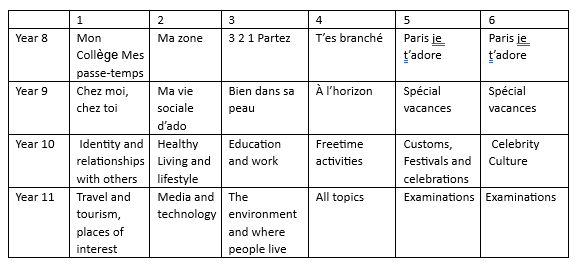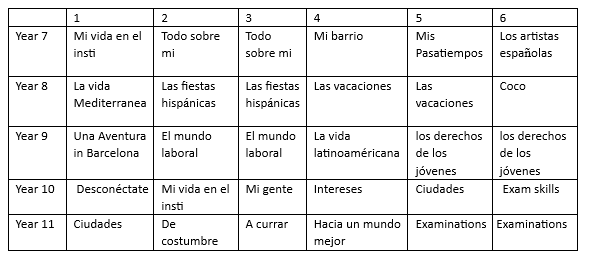Modern Foreign Languages
‘The limits of my language are the limits of my world’ (Wittgenstein)
Meet the Modern Foreign Language Department
|
Name: |
Title: |
Email address: |
|
Mrs K. Ruane |
Head of Department |
|
|
Mrs S. Martin |
Teacher of MFL |
|
|
Mr C. Toal |
Teacher of MFL |
|
|
Miss E. Foreman |
Teacher of MFL |
|
|
Mrs E. Morley Batzios |
Assistant Headteacher, Teacher of MFL |
Intent
The purpose for language learning is to broaden our knowledge and understanding of different countries and cultures. The importance for students to know more about the world in which we live is important in a world where global opportunities are increasing. Through exposure to authentic materials and cultural stimuli, students have the opportunity to develop their appreciation of different cultures. Our aim in the languages department is to equip students not only with knowledge of the language they are learning, but the skills that will enable them to learn any other language in the future. We believe that studying a language gives students the skills and knowledge they will need for success in education, the world of work and later life. We teach the importance of speaking a foreign language in regards to careers and global issues. Knowledge of an additional language will enable our students to become more employable locally, nationally and internationally.
Through an emphasis on the three pillars of progression – phonics, vocabulary and grammar, students will develop the knowledge to enable them to communicate confidently and reinforce many literacy skills from their first language. They will learn how to manipulate grammar to allow them to express and explain their ideas about different themes and to revisit and use core phrases in a variety of contexts and skills.
The department aims to provide a number of different opportunities for students to learn outside the classroom through international visits, competitions and collaboration across the school.

German Scheme of Learning/Courses/Curriculum Map

German Exam Board Specification - AQA GCSE German (8668)*
https://www.aqa.org.uk/subjects/languages/gcse/german-8668
*For Years 10 and 11. Years 7-9 will be a new specification.
French Scheme of Learning/Courses/Curriculum Map

French Exam Board Specification - AQA GCSE French (8652)
https://www.aqa.org.uk/subjects/languages/gcse/french-8652
Spanish Scheme of Learning/Courses/Curriculum Map

Spanish Exam Board Specification - AQA GCSE Spanish (8698)*
https://www.aqa.org.uk/subjects/languages/gcse/spanish-8698
*For Years 10 and 11. Years 7-9 will be a new specification.
Feedback Policy
The primary purpose of feedback is to move students on with their learning. Students receive feedback on their learning in a number of different ways, both formally and informally.
Formative assessment takes place every lesson in many forms including:
- Low stakes quizzing
- Like marking in lessons
- Questioning
- Peer and self-assessment (green pen)
- Examination style questions
Students are provided with detailed written feedback on longer pieces of written work and key pieces. Next steps marking is implemented, alongside other techniques to promote learning and progress. Students are expected to respond to their feedback and make improvements to their work by acting upon it immediately using purple pen.

